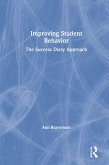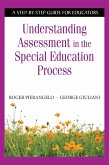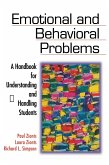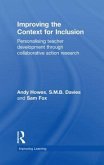Lauren W Collins, Timothy J Landrum, Chris A Sweigart
Improving Student Behavior and Cultivating Meaningful Relationships
A Teacher's Guide to Positive and Preventive Approaches in Inclusive Classrooms
Lauren W Collins, Timothy J Landrum, Chris A Sweigart
Improving Student Behavior and Cultivating Meaningful Relationships
A Teacher's Guide to Positive and Preventive Approaches in Inclusive Classrooms
- Gebundenes Buch
- Merkliste
- Auf die Merkliste
- Bewerten Bewerten
- Teilen
- Produkt teilen
- Produkterinnerung
- Produkterinnerung
This comprehensive guide offers simple and effective strategies for supporting and improving the classroom behavior of all your students, including those with intensive behavior support needs.
Andere Kunden interessierten sich auch für
![Improving Student Behavior Improving Student Behavior]() Ami BravermanImproving Student Behavior135,99 €
Ami BravermanImproving Student Behavior135,99 €![Understanding Assessment in the Special Education Process Understanding Assessment in the Special Education Process]() Roger PierangeloUnderstanding Assessment in the Special Education Process63,99 €
Roger PierangeloUnderstanding Assessment in the Special Education Process63,99 €![Emotional and Behavioral Problems Emotional and Behavioral Problems]() Paul ZiontsEmotional and Behavioral Problems72,99 €
Paul ZiontsEmotional and Behavioral Problems72,99 €![Improving the Context for Inclusion Improving the Context for Inclusion]() Andy HowesImproving the Context for Inclusion173,99 €
Andy HowesImproving the Context for Inclusion173,99 €![Behaviour Barriers and Beyond Behaviour Barriers and Beyond]() Rachel ThynneBehaviour Barriers and Beyond180,99 €
Rachel ThynneBehaviour Barriers and Beyond180,99 €![Children in Difficulty Children in Difficulty]() Julian ElliottChildren in Difficulty183,99 €
Julian ElliottChildren in Difficulty183,99 €![Children in Difficulty Children in Difficulty]() Julian ElliottChildren in Difficulty180,99 €
Julian ElliottChildren in Difficulty180,99 €-
-
-
This comprehensive guide offers simple and effective strategies for supporting and improving the classroom behavior of all your students, including those with intensive behavior support needs.
Produktdetails
- Produktdetails
- Verlag: Taylor & Francis Ltd (Sales)
- Seitenzahl: 308
- Erscheinungstermin: 24. April 2025
- Englisch
- Abmessung: 229mm x 152mm x 19mm
- Gewicht: 612g
- ISBN-13: 9781032745145
- ISBN-10: 1032745142
- Artikelnr.: 71847877
- Herstellerkennzeichnung
- Libri GmbH
- Europaallee 1
- 36244 Bad Hersfeld
- gpsr@libri.de
- Verlag: Taylor & Francis Ltd (Sales)
- Seitenzahl: 308
- Erscheinungstermin: 24. April 2025
- Englisch
- Abmessung: 229mm x 152mm x 19mm
- Gewicht: 612g
- ISBN-13: 9781032745145
- ISBN-10: 1032745142
- Artikelnr.: 71847877
- Herstellerkennzeichnung
- Libri GmbH
- Europaallee 1
- 36244 Bad Hersfeld
- gpsr@libri.de
Lauren W. Collins, Ph.D., is an associate professor of special education at San Diego State University. Her work focuses on the dissemination of practical, evidence-based strategies for students with disabilities, with an emphasis on early literacy and behavioral interventions. Timothy J. Landrum, Ph.D., is a professor of special education at the University of Louisville. He is a leading scholar in the field of emotional and behavioral disorders who specializes in the translation of research into practice. Chris A. Sweigart, Ph.D., is a special education consultant in Kentucky and the creator of Limened, a website for teachers to support students with a variety of challenges.
Introduction
1. Behavioral Interventions and Student-Teacher
Relationships
Part I: Teaching Behavior
2. Establishing Expectations
3. Explicit Instruction
Part II: Encouraging Appropriate Behavior
4. Positive Greetings at the Door
5. Behavioral Momentum
6. Instructional Choice
7. Increasing Opportunities to Respond
8. Precorrection
9. Precision Requests
Part III: Maintaining Appropriate Behavior
10. Behavior Specific Praise
11. Token Economies
12. Positive Group Contingencies
Part IV: Responding to Intensive Behavior Support Needs
13. Differential Reinforcement
14. Check-In Check-Out
15. Behavior Contracts
16. Informal Functional Behavioral Assessment
Closing Thoughts
17. Closing Thoughts
1. Behavioral Interventions and Student-Teacher
Relationships
Part I: Teaching Behavior
2. Establishing Expectations
3. Explicit Instruction
Part II: Encouraging Appropriate Behavior
4. Positive Greetings at the Door
5. Behavioral Momentum
6. Instructional Choice
7. Increasing Opportunities to Respond
8. Precorrection
9. Precision Requests
Part III: Maintaining Appropriate Behavior
10. Behavior Specific Praise
11. Token Economies
12. Positive Group Contingencies
Part IV: Responding to Intensive Behavior Support Needs
13. Differential Reinforcement
14. Check-In Check-Out
15. Behavior Contracts
16. Informal Functional Behavioral Assessment
Closing Thoughts
17. Closing Thoughts
Introduction
1. Behavioral Interventions and Student-Teacher
Relationships
Part I: Teaching Behavior
2. Establishing Expectations
3. Explicit Instruction
Part II: Encouraging Appropriate Behavior
4. Positive Greetings at the Door
5. Behavioral Momentum
6. Instructional Choice
7. Increasing Opportunities to Respond
8. Precorrection
9. Precision Requests
Part III: Maintaining Appropriate Behavior
10. Behavior Specific Praise
11. Token Economies
12. Positive Group Contingencies
Part IV: Responding to Intensive Behavior Support Needs
13. Differential Reinforcement
14. Check-In Check-Out
15. Behavior Contracts
16. Informal Functional Behavioral Assessment
Closing Thoughts
17. Closing Thoughts
1. Behavioral Interventions and Student-Teacher
Relationships
Part I: Teaching Behavior
2. Establishing Expectations
3. Explicit Instruction
Part II: Encouraging Appropriate Behavior
4. Positive Greetings at the Door
5. Behavioral Momentum
6. Instructional Choice
7. Increasing Opportunities to Respond
8. Precorrection
9. Precision Requests
Part III: Maintaining Appropriate Behavior
10. Behavior Specific Praise
11. Token Economies
12. Positive Group Contingencies
Part IV: Responding to Intensive Behavior Support Needs
13. Differential Reinforcement
14. Check-In Check-Out
15. Behavior Contracts
16. Informal Functional Behavioral Assessment
Closing Thoughts
17. Closing Thoughts









